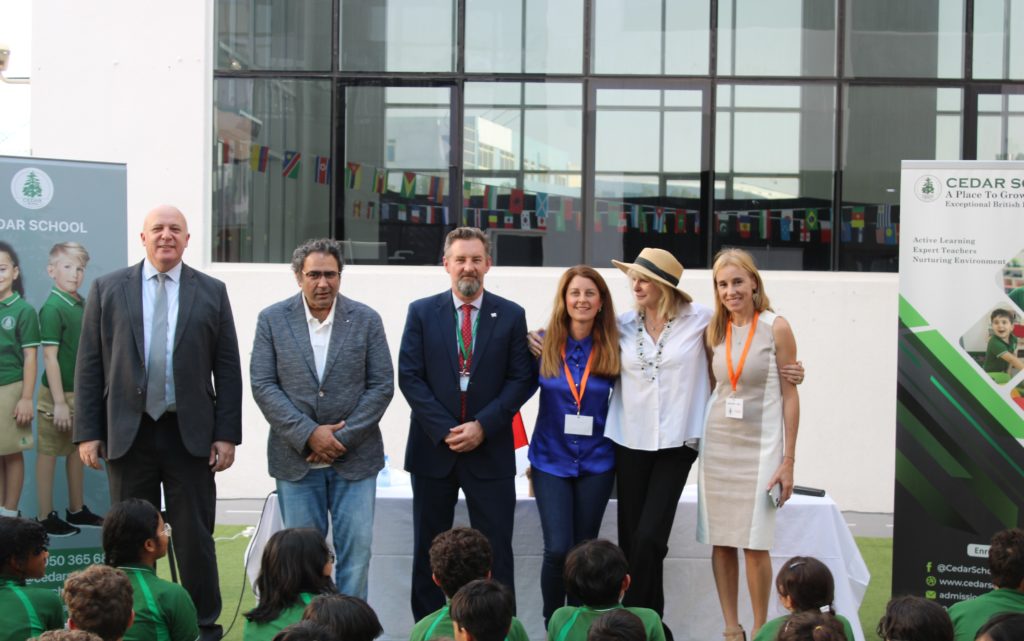Marissa Peer aims to build confidence in UAE pupils
How confident are your children? How confident can they be?
That is the challenge being set by Marissa Peer, the renowned British therapist.
Peer, the celebrated motivational speaker, and best-selling author, has been widely recognised for her expertise in Rapid Transformational Therapy (RTT). Peer’s innovative approach combines principles of psychotherapy, hypnotherapy, neuro-linguistic programming (NLP), and cognitive behavioral therapy (CBT), aiming to deliver fast and lasting change in her clients.
Her career spans over three decades, during which she has garnered acclaim for her effective techniques in treating a range of issues, from anxiety and depression to addiction and weight loss. Peer’s philosophy centers on the belief that the root of many personal issues lies in the way individuals perceive themselves, and by changing these perceptions, profound transformation can occur.
Now she is bringing her Marisa Peer RTT 5-Day Challenge to the UAE, a special program for 6-11 year-olds across schools in the United Arab Emirates. This transformative initiative aims to make a lasting impact on young minds by nurturing confidence, resilience, and self-esteem.
The first of these have already been delivered by Jasmine Navarro, a family well-being expert and Sofia De Maussion, a PR and media expert at Cedar School Alwarqa.
Writing for mentl, here Jasmine, who will be working with Marissa Peer to deliver the challenges, discusses the importance of building confidence.

As a confidence and well-being expert working with children, teenagers, and parents, I have witnessed the transformative power that confidence and self-belief can have on a young person’s life, writes Jasmine.
The Essence of Confidence Building
Confidence is more than just a characteristic; it is a catalyst for a fulfilling and successful life. In my work with children and teenagers, I have come to understand that confidence is a skill that can be nurtured and cultivated, much like any other. The ability to believe in oneself, face challenges head-on, and develop a positive self-image is a gift that lasts a lifetime.
The Consequences of Lacking Confidence
Children who lack confidence and self-esteem face numerous challenges that can impact their overall well-being and future prospects. As a well-being advocate, it is crucial to address these consequences and emphasize the significance of building these skills in children.
Academic Struggles
Confidence is closely linked to academic success. Children who lack confidence may shy away from participating in class, asking questions, or expressing their opinions. This can hinder their academic progress and limit their willingness to explore new subjects and ideas.
Social Isolation
Confidence is the key to positive social interactions. Children who lack confidence may struggle to initiate friendships, engage in group activities, or express themselves authentically. This can lead to feelings of isolation, affecting their emotional well-being.
Emotional Challenges
Low self-esteem and confidence often contribute to emotional challenges such as anxiety and depression. Children who doubt their abilities may experience persistent feelings of inadequacy, impacting their mental health and overall happiness.
Future Professional Limitations
As children transition into adolescence and adulthood, the consequences of lacking confidence become more pronounced in the professional realm. Individuals with low self-esteem may find it challenging to assert themselves in the workplace, limiting their career growth and potential for leadership roles.

The Impact of Confidence on Well-being
Conversely, instilling confidence in children has a profound positive impact on their well-being and future success. As a certified coach and trainer working with children and parents, I have witnessed the transformative journey of individuals who embrace confidence-building exercises.
Academic Excellence
Confident children are more likely to actively engage in the learning process, take on challenges, and explore new subjects. This proactive mindset contributes to academic excellence and a genuine love for learning.
Social Flourishing
Confidence is like a friendly helper in social situations. Children who trust in themselves find it easier to make friends, form meaningful connections, and contribute positively to group dynamics.
Emotional Resilience
Confidence equips children with emotional resilience, enabling them to face life’s challenges with courage and adaptability. They develop coping mechanisms, problem-solving skills, and a capacity to bounce back from setbacks.
Professional Success
Confidence is a valuable asset in the professional world. Individuals who possess self-belief are more likely to pursue ambitious goals, take on leadership roles, and contribute innovatively to their chosen fields.
In short, stressing the importance of building confidence in children is crucial.
